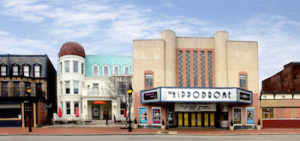
*The Hippodrome Theater, a black entertainment venue in Richmond, Virginia’s Jackson Ward neighborhood, was celebrated on this date in 1914.
Charles A. Somma opened the Hippodrome Theater as a vaudeville and movie theater. The theater played a significant role in entertaining Richmond's Black community during the early 20th century. It is located on Second Street in Richmond, once known as The Deuce. The Deuce was a famous center of black commerce in Richmond, and the street was lined with stores, restaurants, banks, and theaters. During this period, Richmond's Black community was heavily influenced by New York City's Harlem Renaissance, and the theater attracted performers who were prominent in the cultural movement's performance scene.
These performers included talents such as Billie Holiday, Bill Robinson, Ray Charles, Nat King Cole, Louis Armstrong, Moms Mabley, James Brown, Ida Cox, Ella Fitzgerald, and countless others who performed on the Hippodrome's stage. In 1937, the Hippodrome Theater was purchased from Charles A. Somma by the Abe Lichtman theater chain. In 1945, the theater caught fire, but it reopened its doors to the public in 1947. After the fire, the theater was renovated and remodeled in an Art Deco style of architecture, featuring new amenities such as air conditioning and the latest technical equipment.
Once the theater reopened after the fire, it primarily functioned as a movie theater throughout the 1950s. It closed in the 1960s, reopened, and then closed again in the 1970s, briefly functioning as a church. The theater reopened in the 1980s as a movie theater. The theater's current owner is Ronald Stalling, and he continues to hold performances on the legendary stage and offer film showings. Directly beside the theater lies the Taylor Mansion, originally the home of Rev. William Lee Taylor. The mansion was built in 1907 by architect John A. Lankford, and today, it functions as the Speakeasy Grill restaurant, which specializes in southeastern cuisine. The Hippodrome Theater and the Taylor Mansion are part of Stalling's current project to revive Jackson Ward and Second Street as an important Black cultural hub, as they were during the early 20th century.